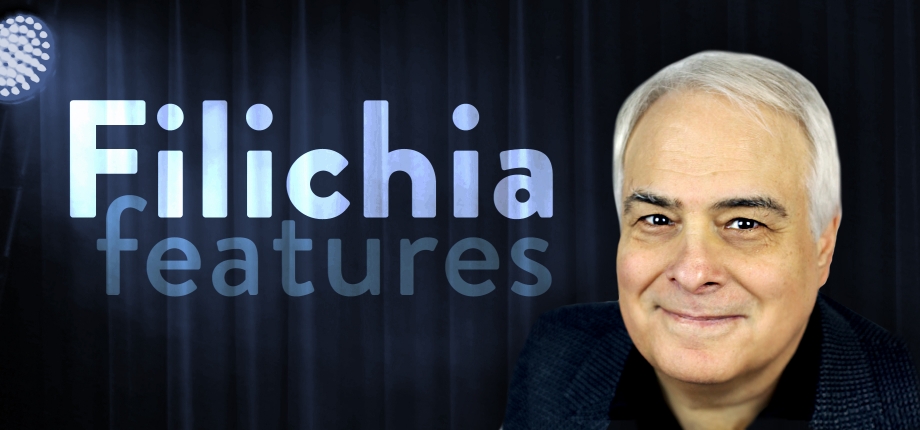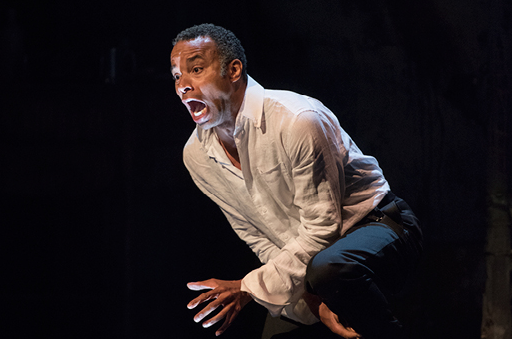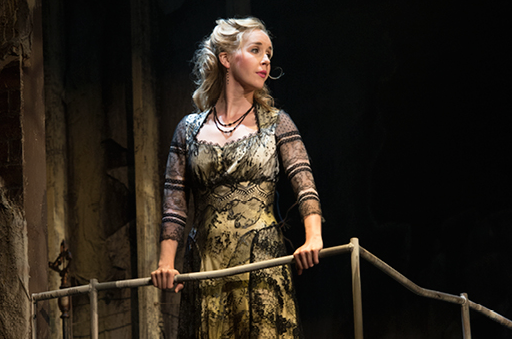Filichia Features: Here Comes the Judge’s “Johanna”

Filichia Features: Here Comes the Judge’s “Johanna”
Once again, a new production of Sweeney Todd -- now at the always phenomenal Shaw Festival in Niagara-on-the-Lake, Ontario -- dares to do what the original production didn’t.
In fact, all 12 productions I’ve seen since the tenth preview of the Stephen Sondheim-Hugh Wheeler 1979 masterpiece at the Uris have included Judge Turpin’s “Johanna.”
That song is not to be confused with Anthony’s Act One ode to his newly found love, which Stephen Sondheim also titled “Johanna.” It has arguably the best “wrong notes” you’ll ever hear; they occur on the words “dream” and “window,” with each note as tasty as bittersweet chocolate.
No, Anthony’s “Johanna” is a ballad while the Judge’s “Johanna” certainly is not.
Nor is Turpin’s “Johanna” the same one that Sweeney sings in Act Two. That’s yet another completely different song, one in which Sweeney muses about his lost daughter.
Can you imagine any other songwriter writing three songs for the same musical and using an identical title for each? Once again, Sondheim proved that he breaks and makes so-called “rules” as he goes along. (Wonder which ones he’ll shatter in his next musical that was just announced for next season at The Public Theatre?)

Marcus Nance in The Shaw Festival's production of Sweeney Todd (Photo by Emily Cooper).
Turpin’s “Johanna” was the 13th song that Sondheim wrote for the show. It has Turpin on his knees as a voyeur, peeking through a keyhole into the room where Johanna, his ward since infancy, is doing nothing in particular.
Turpin then punishes himself for his salacious thoughts by flagellating his back and singing, “Mea culpa!”, increasing it to “Mea maxima culpa!” and then to “Mea maxima maxima culpa!”
(Have you ever noticed that “Mea culpa” is go-to phrase for people who really DON’T want to apologize? It’s SO much easier to ask for forgiveness in Latin than say in plain English “My fault,” “My grievous fault” and “My most grievous fault.”)
Frankly, even if Turpin weren’t singing aloud and was simply revealing to us his inner-most thoughts and secrets, you’d think that Johanna would hear the sound of whip-on-flesh and come out to see what was going on.
But that wasn’t the reason that Turpin’s “Johanna” was dropped.
Says original cast member Mary-Pat Green, “We did the first two previews on Tuesday night and Wednesday afternoon. Then between the Wednesday shows, (director) Hal (Prince) and Steve called us together and announced that the song would be cut. Ed Lyndeck had been told earlier on that the number might be an issue and have to go, so he was prepared for the possibility.” (For the record, Green believed he was as brilliant in “Johanna” he was in the rest of the show).
Green recalls that “The problem was the audience reaction. Many people weren’t able to handle those thoughts in 1979.” No, masochism has never been the usual subject for a Broadway show tune. Even a quarter-century later, when the film version was being readied, Burton and screenwriter John Logan cut this “Johanna” as quickly as Sweeney cuts throats.
Even if Judge Turpin had left the whip in the horse stable, many audiences wouldn’t have approved of his voyeurism. “The light behind your window … penetrates your gown” Turpin sang rapturously before realizing what a swine he is and amending his feelings with “Down! Down! Down!”
Turpin eventually blames the victim. “You tempt me with your innocence,” he snarls. Leave the poor girl alone, will you?

Kristi Frank in The Shaw Festival's production of Sweeney Todd (Photo by David Cooper).
Sondheim explained in Mark Eden Horowitz’s Sondheim on Music, (aptly subtitled Minor Details and Major Decisions) why he wrote the piece in the first place: “(Turpin)’s the only character without a song … of his own.” And while many would argue that such a man has no music in him, Sondheim saw some in this judge who may well remind us of some politicians and preachers.
In the book, Sondheim recalled that Prince was “extremely offended” by the song “and felt the audience would be, too. Prince found it “explicit and gruesome.” Many cast members agreed, so out it went.
“I insisted that the Judge’s song be in the vocal score,” Sondheim informed. “I wanted it for the future. It’s in the appendix where it becomes optional, but I wanted it printed. Meaning: if you want to do the song, here it is.”
(There you have it, directors! Your choice!)
But I wouldn’t have seen Turpin’s “Johanna” in 12 of 13 Sweeneys if it had just been put on the printed page. Dozens of directors have told me flat-out over the years that they hate reading sheet music, and plenty more have told me that don’t read music at all. No, for them to form an opinion on Turpin’s “Johanna,” they had to hear it – and they did, on the original cast album, in one of the reasonably rare instances when a dropped song makes it to an official recording.
“When we went to record the show,” says Green, “we didn't know it would be included, so it was a wonderful surprise.”
Because Turpin’s “Johanna” has been on that never-out-of-print cast album – and has been included on the subsequent Sweeney recordings of the 2000 New York Philharmonic concert and the 2005 Broadway revival -- literally millions have been able to hear it. Although many of them might have been completely turned off the first time they heard it, as Frank Rich wrote in his review of Into the Woods, “Time and second hearings always tell with a Sondheim score.” And have you EVER heard of anyone listening to Sweeney Todd only once?
For those who are planning to produce and/or direct Sweeney Todd, here’s where Shaw Festival’s artistic director Jackie Maxwell can help. She found a way to stage Turpin’s “Johanna” in a way that can’t possibly offend anyone.
The solution seems so simple, now that she’s thought of it for us. The Judge, admirably played by Marcus Nance, doesn’t carry or use a whip. He doesn’t look through the keyhole. And, when you think of it, he doesn’t need to in order to express the feelings he has.
Now this “Johanna” becomes a song in which he remembers doing those horrible things. More to the point, the agony comes not from a severe whipping, but from intense guilt. That’d make a guy thrash all over the place, which is what that Nance did on stage. But it was enough to make even the most soft-hearted riveted without being repulsed.
This scene alone – but every other one, too – should get you to Niagara-on-the-Lake to attend the tale of Sweeney Todd.
You may e-mail Peter at pfilichia@aol.com. Check out his weekly column each Monday at www.broadwayselect.com and Tuesday at www.masterworksbroadway.com. His book, The Great Parade: Broadway’s Astonishing, Never-To-Be Forgotten 1963-1964 Season is now available at www.amazon.com.

























